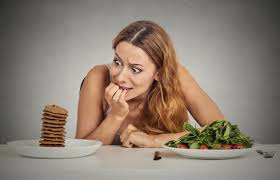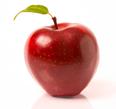
Is Yo-Yo dieting part of your story? You lose a few pounds and start to feel great just to have the weight return a few weeks or months later. You blame your will power and lack of motivation. You just aren’t strong enough to resist temptation. Sound familiar? Followed by berating yourself over your own “poor decisions.” This is the most common misconception of binge eating and intense food cravings; unfortunately no one talks about what is actually going on inside the body that triggers those insatiable and out-of-control behaviors.
Here is a little secret: you are not in total control of your food choices! Wait….what?? It’s true! According to Jane Foster, a PhD neuroscientist at McMaster University in Ontario and leading expert on the microbiome, “there is a unique pathway that has co-evolved between animals and the resident bacteria in their gut, and there is a bottom-up communication about diet.” Scientists have known for years how sensitive the gut microbial community is to the foods we eat. It wasn’t until recently they discovered gut bacteria can actually influence what foods we choose and why.
All of the resident bugs that live within the gastrointestinal tract make up the gut microbiome. Humans are microbial constructs. 90% of cells in the human body are bacterial form, so it’s no surprise the health of the microbiome dictates the health of the body. There are trillions of gut bugs (called microbes) that intimately interact with all areas of the body including the immune system and the brain. A bi-directional communication pathway exists between the gut and brain called the gut-brain axis. One major player in this communication is the vagus nerve; the 10th cranial nerve that travels from the base of the brain to the rest of the body and is responsible for sending chemical messengers back and forth. Gut bacteria help produce neurotransmitters – the body’s chemical messengers; they influence and regulate every process in the body including cellular metabolism, heart rate, blood pressure, digestion , mood, memory, sleep, and stress reactivity. 90% of serotonin production, for example, is synthesized directly from gut microbes. The vagus nerve pathways are then responsible for transporting serotonin to the brain and peripheral organs.
Felice Jacka, Director of the Food and Mood Centre and President of the International Society for Nutritional Psychiatry Research in Australia, states “Poor diet is the leading cause of premature death in men and #2 in women.” Her team found in a recent animal study with diet manipulation there were significant neuro-protein changes in the hippocampus, the same area antidepressants target. They then examined MRI scans from 250 older Australian adults and found those with diets higher in fruits, vegetables, and fish had a larger hippocampal region. Gut bacteria ferment on dietary fiber creating metabolites that influence hippocampal growth, metabolism, and the blood-brain barrier.
It is universally understood that eating a diet full of colorful fruits and vegetables, healthy fats, and organic protein sources is important, but why is it so difficult to implement “healthy eating” into everyday life? There is a disconnect between knowledge and behavior and the numbers show it. According to a 2020 report from the Centers for Disease Control, over 40% of U.S. American adults both men and women in all age groups from 20 to over 60 are clinically obese. Fascinating enough, science is starting to show gut microbiome dysfunction is directly linked to metabolic dysfunction.
Carlos Ribeiro, neuroscientist at Campalimaud Center for the Unknown in Lisbon and senior author of a recent study on fruit flies published in PLOS Biology, found specific strains of gut bacteria can actually help a host animal detect nutritional deficiencies and dictate appetite and cravings. In the study, Ribeiro’s team found flies lacking essential amino acids got strong cravings for yeast to make up for the missing nutrients. They also found by manipulating particular bacterial strains in the digestive tract, the flies lost the urge to eat excess protein. The study indicates gut bacterial fermentation metabolites called short chain fatty acids carry information from the gut to the brain, telling the host what foods to choose and when to stop eating. “What the bacteria do for appetite is kind of like optimizing how long a car can run without needing to add more petrol to the tank,” Riberiro states. But what if the gut microbiome is dysfunctional? It loses the ability to communicate properly with its host (you). Metabolic flexibility is the body’s ability to store fat or burn it, which becomes distorted in the presence of chronic low-grade inflammation and gut dysbiosis.
Knowing this, you can stop beating yourself up entirely for “falling off the wagon” and satisfying your out-of-control cravings. But, if you are dedicated to making real change in your health, start with the gut. Diet and exercise influences bacterial colonies very quickly. Here are some ways to boost your bacterial resilience and break the cycle:
- Include polyphenols in your diet! Polyphenolic compounds are found naturally in plant foods such as fruits and vegetables, red wine, raw cacao, and teas and contain antioxidant activity that impact gut bacteria. Look for supplements containing EGCG (from green tea), astaxanthin, zeaxanthin, resveratrol, pterostilbene, quercetin, and luteolin.
- Eat high quality protein sources. Amino acids synthesize neurotransmitters, support tissue repair, maintain muscle tone, support digestion, maintain healthy skin, and provide energy. Wild caught fish and shellfish, organic meats and eggs, raw nuts and seeds, and organic dairy are great choices. It’s not ideal to rely solely on protein supplements, as many are incomplete and are overly processed. However, bone broth, collagen, pea, whey, and marine sources are supplemental options.
- Prebiotics feed the gut microbiome. The diversity of dietary fiber in the diet in more important than just including fiber. Bacterial fermentation on dietary fiber modulates the immune system and influences how genes behave. Include foods such as Jerusalem artichokes, onion, jicama, leeks, garlic, green banana, and sweet potato. Soil based probiotic supplements such as Terra Flora and medicinal mushroom supplements such as Reishi also contain prebiotics.
- Probiotics. Probiotic foods have undergone lactic acid fermentation, converting natural sugars into lactic acid in an oxygen-free environment. They are loaded with beneficial microbes, enzymes, vitamins, and minerals to support a healthy intestinal tract. Foods include raw sauerkraut, kimchi, kombucha, kefir, yogurt, and kvass. If you choose a probiotic supplement, look for one with minimal added ingredients and a diversity of many different strains.
- Omega-3 rich fatty acids. DHA and EPA found in fish oils and marine sources have been shown to positively impact gut microbes by increasing anti-inflammatory short chain fatty acids and maintaining intestinal wall integrity.
- Eliminate Refined Sugars. Processed sugar can feed pathogenic strains of bacteria and fungi, leading to gut dysbiosis. Bacterial colonies need to be diversified and in contained in certain ratios to other species. If a particular strain, such as candida, overgrows, it can wreak havoc within the microbial community. Diets high in refined sugar can also throw the pH off, favoring opportunistic bacteria.
Hippocrates is continually quoted today for his brilliant assessment of the human body – “All disease begins in the gut.” Make your body a priority, for it’s the only one you get!
RESOURCES:
http://www.scientificamerican.com/article/how-gut-bacteria-tell-their-hosts-what-to-eat/
https://www.ncbi.nlm.nih.gov/pmc/articles/PMC5808284/
https://www.ncbi.nlm.nih.gov/pmc/articles/PMC6378305/
https://www.ncbi.nlm.nih.gov/pmc/articles/PMC4886662/
https://www.ncbi.nlm.nih.gov/pmc/articles/PMC6950569/
https://www.ncbi.nlm.nih.gov/pmc/articles/PMC5751248/
How portion distortion makes you overeat

